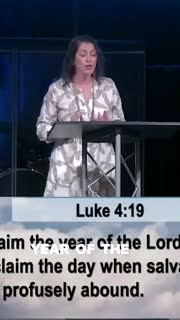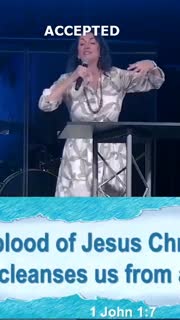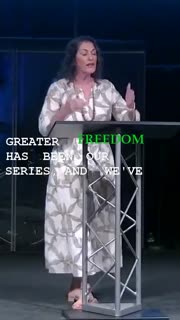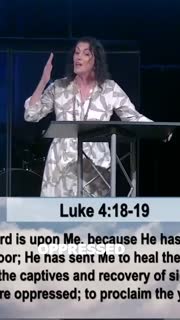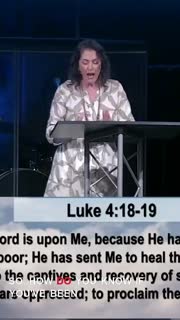Embracing God's Acceptance: Healing from Rejection
Devotional
Sermon Summary
Bible Study Guide
Sermon Clips
### Quotes for Outreach
1. "The acceptable year of the Lord means that Jesus came into this world to bring good news. Listen, there's so much bad news these days. Jesus came to bring good news that when we accept Jesus, God accepts us. The acceptable year of the Lord. It means that Jesus accepts us if we accept him. Here's the problem. A lot of people have a hard time believing this. And that's where they stay stuck." [01:04:14] (28 seconds)
2. "You are made in the image of God. You are loved irrevocably and totally accepted by God. Condemnation causes you to give up on yourself. Please understand God wants to heal you. And when we put ourselves down by saying things like, oh, you know what? I'm just ugly. I'm stupid. I'm nothing. That does not glorify our creator. I hear people say, I hate myself. Stop. Stop. Proclaim the word of God." [01:06:02] (39 seconds)
3. "We are accepted because of the sacrifice of Jesus. And he was accepted by God. His sacrifice was accepted. And now we are accepted. So you don't need to live one more moment with rejection. You can live knowing you're loved and accepted by God. Go to him. Let him speak to you. Let him show his love to you. He is love. And if he's in you, love is in you, folks. We are loved and accepted." [01:28:12] (34 seconds)
4. "Lay the ax to the lie that says you have nothing to offer at church by choosing to believe that the truth of God gives gifts to every member for the good of all. You all have something to offer. You all have something to offer. You all have something to offer. We love you. We accept you. We care about you. And guess what? We need you." [01:29:54] (20 seconds)
5. "Will you today accept that you are accepted by God? And hold on to it. The enemy's going to try to steal it when you walk out that door. Don't let him do it. Lay the ax to it. Will you, I ask, accept your acceptance? I'm going to ask everyone to stand. And I'm going to ask the prayer team to come down right now." [01:31:37] (23 seconds)
### Quotes for Members
1. "Greater Freedom has been our series, and we've been teaching on how to deal with root causes. Because I'm going to tell you, until we get to the root, we're not going to experience freedom. And we found a key in Matthew 3.10 when John the Baptist said this, The ax is laid to the root of the trees. Therefore, every tree which does not bear good fruit, we're called to bear good fruit, is cut down and thrown into the fire." [57:14] (26 seconds)
2. "So, being oppressed speaks of being beat up. Being beat down, held up, held back, bruised and abused. Now, all of us feel this way at some time. But listen, there's so many people walking around with the bruises of Satan in their lives. It doesn't have to always be about somebody else, but it can be about others. I mean, sometimes we do it to ourselves. Sometimes others do it to us and we become bruised and broken and beaten." [01:00:08] (33 seconds)
3. "So how do you know if you've been bruised in life? Well, think about a physical bruise. Most bruises, they're not really that painful until you touch them. And when you touch a bruise, you find out it does hurt. And people who are bruised are many times very, very touchy. The minute you get close or you touch something in them, you discover real quickly that they've been hurt." [01:01:00] (31 seconds)
4. "Rejection can be a tool in God's hands to expose what is really in us so that he can bring it up and out and heal it, and that is exactly what he did in my life. Thank you. Hallelujah. Amen. Amen. He was shaping me through rejection. Listen to what John Eldredge says. God wounds us in the areas, or he allows us to be wounded in the areas. We are most vulnerable so that he can heal us, and that's exactly what he did with me." [01:23:07] (31 seconds)
5. "We all need love and acceptance from others. However, until we receive God's love and acceptance, we don't need to receive God's acceptance. No amount of acceptance from others is ever, ever, ever going to be enough. The more she did for me, the more I demanded. It was pretty sad. So I told you how Ann rejected me for six years. The whole time this happened, I believed that if I just could have a relationship with her, I wouldn't feel rejected anymore, but that did not heal my rejection." [01:24:42] (32 seconds)
Ask a question about this sermon
1. "The acceptable year of the Lord means that Jesus came into this world to bring good news. Listen, there's so much bad news these days. Jesus came to bring good news that when we accept Jesus, God accepts us. The acceptable year of the Lord. It means that Jesus accepts us if we accept him. Here's the problem. A lot of people have a hard time believing this. And that's where they stay stuck." [01:04:14] (28 seconds)
2. "You are made in the image of God. You are loved irrevocably and totally accepted by God. Condemnation causes you to give up on yourself. Please understand God wants to heal you. And when we put ourselves down by saying things like, oh, you know what? I'm just ugly. I'm stupid. I'm nothing. That does not glorify our creator. I hear people say, I hate myself. Stop. Stop. Proclaim the word of God." [01:06:02] (39 seconds)
3. "We are accepted because of the sacrifice of Jesus. And he was accepted by God. His sacrifice was accepted. And now we are accepted. So you don't need to live one more moment with rejection. You can live knowing you're loved and accepted by God. Go to him. Let him speak to you. Let him show his love to you. He is love. And if he's in you, love is in you, folks. We are loved and accepted." [01:28:12] (34 seconds)
4. "Lay the ax to the lie that says you have nothing to offer at church by choosing to believe that the truth of God gives gifts to every member for the good of all. You all have something to offer. You all have something to offer. You all have something to offer. We love you. We accept you. We care about you. And guess what? We need you." [01:29:54] (20 seconds)
5. "Will you today accept that you are accepted by God? And hold on to it. The enemy's going to try to steal it when you walk out that door. Don't let him do it. Lay the ax to it. Will you, I ask, accept your acceptance? I'm going to ask everyone to stand. And I'm going to ask the prayer team to come down right now." [01:31:37] (23 seconds)
### Quotes for Members
1. "Greater Freedom has been our series, and we've been teaching on how to deal with root causes. Because I'm going to tell you, until we get to the root, we're not going to experience freedom. And we found a key in Matthew 3.10 when John the Baptist said this, The ax is laid to the root of the trees. Therefore, every tree which does not bear good fruit, we're called to bear good fruit, is cut down and thrown into the fire." [57:14] (26 seconds)
2. "So, being oppressed speaks of being beat up. Being beat down, held up, held back, bruised and abused. Now, all of us feel this way at some time. But listen, there's so many people walking around with the bruises of Satan in their lives. It doesn't have to always be about somebody else, but it can be about others. I mean, sometimes we do it to ourselves. Sometimes others do it to us and we become bruised and broken and beaten." [01:00:08] (33 seconds)
3. "So how do you know if you've been bruised in life? Well, think about a physical bruise. Most bruises, they're not really that painful until you touch them. And when you touch a bruise, you find out it does hurt. And people who are bruised are many times very, very touchy. The minute you get close or you touch something in them, you discover real quickly that they've been hurt." [01:01:00] (31 seconds)
4. "Rejection can be a tool in God's hands to expose what is really in us so that he can bring it up and out and heal it, and that is exactly what he did in my life. Thank you. Hallelujah. Amen. Amen. He was shaping me through rejection. Listen to what John Eldredge says. God wounds us in the areas, or he allows us to be wounded in the areas. We are most vulnerable so that he can heal us, and that's exactly what he did with me." [01:23:07] (31 seconds)
5. "We all need love and acceptance from others. However, until we receive God's love and acceptance, we don't need to receive God's acceptance. No amount of acceptance from others is ever, ever, ever going to be enough. The more she did for me, the more I demanded. It was pretty sad. So I told you how Ann rejected me for six years. The whole time this happened, I believed that if I just could have a relationship with her, I wouldn't feel rejected anymore, but that did not heal my rejection." [01:24:42] (32 seconds)
